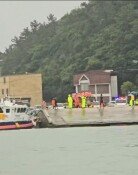Accident Could Lead to Better Understanding Between Koreas
Accident Could Lead to Better Understanding Between Koreas
Posted April. 25, 2004 21:45,
With numerous civic groups in South Korea launching full-out relief efforts for the massive train collision in Yongcheon, North Korea, an increasing number of voices are calling for simplification of rescue channels and the necessity of making direct rescue work available. Experts stress that this accident provides a chance to improve the current relationship between the two Koreas through direct aid to people in North Korea.
Relief workers at the scene are desperate. The Council of Civic Groups for Cooperation with North Korea, comprising 30 civic groups, including the Korean Sharing Movement and Good Neighbors, held a meeting last Saturday and discussed how to provide aid to North Korea. The council is currently negotiating with North Korea on dispatching local medical teams to the North. Lee Jang-hee, co-CEO of the Civil Headquarters for Activating South-North Economic Cooperation in Korea, said, We are recruiting voluntary workers to ensure that they are dispatched as soon as the North asks.
He also stressed we should keep in mind that civic groups in South Korea were only satisfied with furnishing relief supplies to North Korea when other international relief agencies were active in rescue work from 1995 to 1996, when North Korea was suffering from a food crisis and serious flooding.
The accident may provide a turning point in restoring mutual credibility and sharing more information between the two Koreas as well. Some even argue that aggressive support through rescue works in this accident could pave the way for the restoration of trust between the Koreas.
Yang Seung-ham, a political scientist at Yonsei University, advised, Active humanitarian aid from both civic groups and the government is likely to provide some cues ton how to tackle pending political and diplomatic issues such as North Koreas nuclear problem.
Nam Seong-wuk, professor of North Korean Studies at Korea University said, Considering Yongcheon is only 15 kilometers away from Sinuiju, the restoration of this area is highly likely to directly influence economic development in the Sinuiju area. If our government, taking such facts into account, actively participates in restoration work, South-North economic cooperation will surely be taken one step further.
Dong Yong-seung, research fellow in the Samsung Economic Research Institute, said, Civic group participation in relief work in the North can help secure a new channel for sharing more information and, consequently, produce positive effects in the relationship between the two Koreas.
It is necessary to simplify the channels of aid. Some contend that simplification of channels and unification of methods, rather than accepting various ways and methods, are indispensable for effective support. Since there is little trustworthy information available about North Korea, individual rescue efforts could trigger further confusion.
Jeon Hyeon-jun, a research fellow of the Korean Institute of Unification, said, It is possible to achieve unified aid to the North with the cooperation of various civic groups and thus, civic groups, which have been active in helping North Korean problems such as the National Red Cross of the Republic of Korea should spearhead the initiative for aid simplification efforts.
Wan-Bae Lee roryrery@donga.com needjung@donga.com



![하버드 졸업 연설 中유학생, ‘아빠 찬스’ 논란[지금, 이 사람]](https://dimg.donga.com/c/138/175/90/1/wps/NEWS/IMAGE/2025/06/02/131732670.4.jpg)


